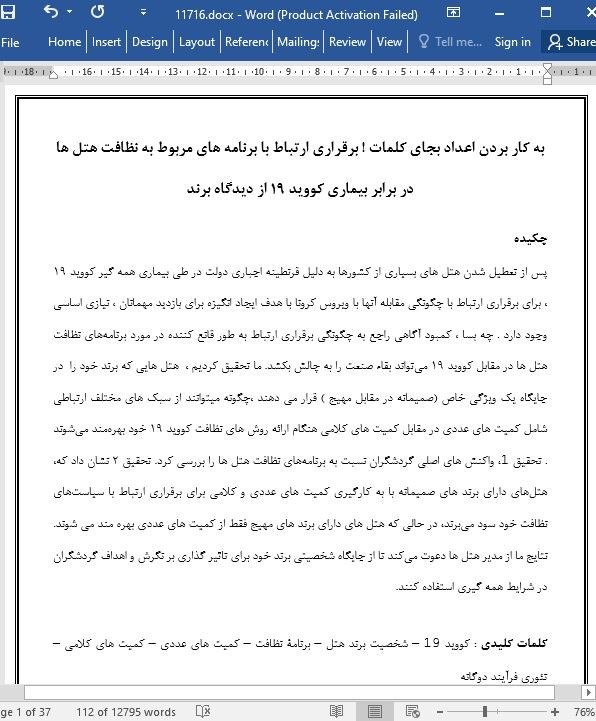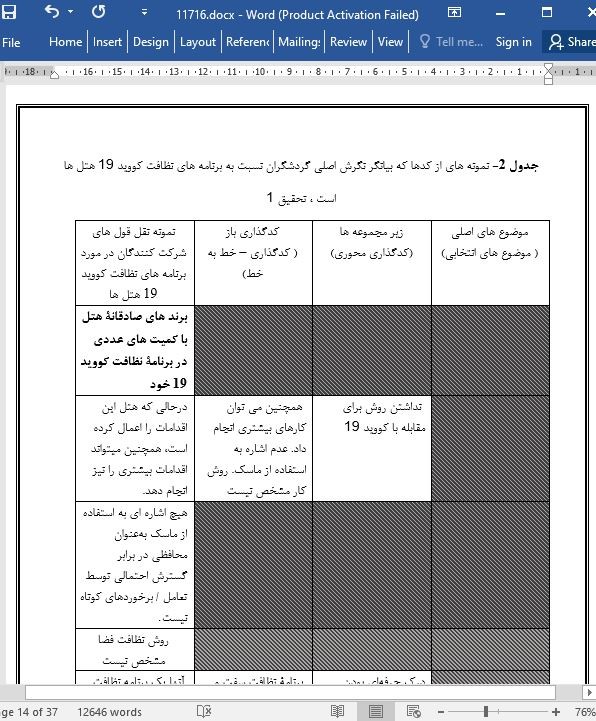
برقراری ارتباط با برنامه های مربوط به نظافت هتل ها در برابر بیماری کووید ۱۹ از دیدگاه برند
چکیده
پس از تعطیل شدن هتل های بسیاری از کشورها به دلیل قرنطینه اجباری دولت در طی بیماری همه گیر کووید ۱۹ ، برای برقراری ارتباط با چگونگی مقابله آنها با ویروس کرونا با هدف ایجاد انگیزه برای بازدید مهمانان ، نیازی اساسی وجود دارد . چه بسا ، کمبود آگاهی راجع به چگونگی برقراری ارتباط به طور قانع کننده در مورد برنامههای نظافت هتل ها در مقابل کووید ۱۹ میتواند بقاء صنعت را به چالش بکشد. ما تحقیق کردیم ، هتل هایی که برند خود را در جایگاه یک ویژگی خاص (صمیمانه در مقابل مهیج ) قرار می دهند ،چگونه میتوانند از سبک های مختلف ارتباطی شامل کمیت های عددی در مقابل کمیت های کلامی هنگام ارائه روش های نظافت کووید ۱۹ خود بهرهمند میشوند . تحقیق 1، واکنش های اصلی گردشگران نسبت به برنامههای نظافت هتل ها را بررسی کرد. تحقیق ۲ نشان داد که، هتلهای دارای برند های صمیمانه با به کارگیری کمیت های عددی و کلامی برای برقراری ارتباط با سیاستهای نظافت خود سود میبرند، در حالی که هتل های دارای برند های مهیج فقط از کمیت های عددی بهره مند می شوند. نتایج ما از مدیر هتل ها دعوت میکند تا از جایگاه شخصیتی برند خود برای تاثیر گذاری بر نگرش و اهداف گردشگران در شرایط همه گیری استفاده کنند.
1. مقدمه
همه گیری ویروس کرونا Covid 19)) یکی از تاثیرگذارترین وقایع قرن ۲۱ است و تاثیر آن بر صنعت مهمان نوازی و گردشگری چشمگیر است. در طرف تامین ، با تخمین ۷۵ میلیون شغل در معرض خطر فوری، عملیات مهمان نوازی و گردشگری بسیاری از کشورها تعطیل شده است. در طرف تقاضا، این همه گیری بر رفتار گردشگران در زمان سفر، رزرو اقامتگاه و مصرف فضای فیزیکی تاثیر میگذارد.هنگامی که جهان خود را با بیماری کووید ۱۹ تطبیق می دهد ، سیاستگذاران در گوشه و کنار جهان به تدریج، تحرک افراد را بازیابی می کنند و امکانات مربوط به مهمان نوازی و گردشگری را از سر میگیرند .
4.3. محدودیت ها و تحقیقات آینده
این کار که باید در مطالعات آینده به آن توجه شود ،بدون محدودیت نیست . ابتدا ، لازم است اعتبار بیرونی آزمایش ما از جمله سبک های ارتباطی، که هر دو کمیت عددی و کلامی را در یک حالت با یک نمونه بزرگتر درگیر می کنند ، ارزیابی شود. هم اکنون نهاد های مهمان نوازی و گردشگری، همچنین از برچسبهایی برای اشاره به نظافت منطقه مهمان نوازی با اقدامات ایمن علیه کووید ۱۹ استفاده می کنند. دلیل استفاده هتل ها از برچسبهایی رایگان کووید ۱۹ همراه با کمیت های عددی و کلامی برای پیشرفت برنامه کاری صنعت مهمان نوازی پس از همه گیری ،جالب خواهد بود.
Abstract
After hotels in many countries were forced to close in government-imposed lockdowns during the COVID-19 pandemic, there is an inherent need to communicate how they deal with the coronavirus to motivate guests to visit. However, lack of knowledge about how to persuasively communicate about hotels’ cleaning programs for COVID-19 can challenge the industry’s survival. We investigated how hotels that position their brand as a particular personality (sincere vs. exciting) could benefit from different communication styles (inclusion of numerical vs. verbal quantifiers) when presenting their COVID-19 cleaning procedures. Study 1 explored tourists’ central attitudinal responses toward hotels’ cleaning programs. Study 2 demonstrated that sincere hotel brands would benefit from using numerical and verbal quantifiers to communicate their cleaning policies, whereas exciting hotel brands would benefit only from numerical quantifiers. Our results invite hotel managers to use their brand personality positioning to influence tourists’ attitudes and intentions in a pandemic context.
1. Introduction
The coronavirus (COVID-19) pandemic is one of the most impactful events of the 21 st century and its effect on the hospitality and tourism industry is tremendous (Zenker and Kock, 2020). On the supply side, the hospitality and tourism operations of many countries have mostly been shut down (Baum and Hai, 2020), with an estimated 75 million jobs at immediate risk (World Travel and Tourism Council, 2020). On the demand side, this pandemic will affect tourists’ behavior while traveling, booking accommodation (Zenker and Kock, 2020), and consuming physical spaces (Wang and Ackerman, 2018). As the world adjusts to COVID-19, policymakers worldwide are progressively restoring individuals’ mobility and re-opening hospitality and tourism facilities.
4.3. Limitations and future research
This work is not without limitations that should be addressed in future studies. First, it is necessary to evaluate the external validity of our experiment, including communication styles that combine both numerical and verbal quantifiers in the same condition with a bigger sample. Currently, hospitality and tourism organizations are also using labels to signal that a hospitality area was cleaned with secure procedures against COVID-19 (World Tourism Organization, 2020). It will be interesting to analyze hotels’ use of COVID-19-free labels combined with numerical and verbal quantifiers to advance in the post-pandemic hotel industry agenda (Hao et al., 2020).
چکیده
1. مقدمه
2. چارچوب تئوری
2.1. سبک های ارتباطی: استفاده از کمیت های عددی در مقابل کمیت های کلامی در دوره کووید ۱۹
2.2. شخصیت برند هتل
2.3 شخصیت برند هتل و استفاده از کمیت های هنگام برقراری ارتباط با برنامه نظافت هتل ها در مقابل کووید 19
3. روش ها
3.1 . تحقیق اول. روش های استنباط آنلاین برای بررسی ارزیابی گردشگران نسبت به برنامه های نظافت کوید ۱۹ هتل ها .
3.2 تحقیق ۲. سبک های ارتباطی درباره برنامه نظافت کووید ۱۹ و شخصیت های برند هتل ها
4. مباحثه کلی
4.1 پیامد های تئوری
4.2 پیامد های مدیریتی
4.3. محدودیت ها و تحقیقات آینده
Abstract
1. Introduction
2. Theoretical framework
2.1. Communication styles: the use of numerical versus verbal quantifiers in the COVID-19 era
2.2. Hotel brand personality
2.3. Hotel brand personality and the use of quantifiers when communicating the hotel’s COVID-19 cleaning program
3. Methods
3.1. Study 1. Online elicitation techniques to examine tourists’ evaluations of hotels’ COVID-19 cleaning programs
3.2. Study 2. Communication styles about the COVID-19 cleaning program and hotels’ brand personalities
4. General discussion
4.1. Theoretical implications
4.2. Managerial implications
4.3. Limitations and future research
Appendix A. Brand personality and hotels’ COVID-19 cleaning program manipulation for Study 1 and Study 2
Appendix B. Supplementary data
References
- اصل مقاله انگلیسی با فرمت ورد (word) با قابلیت ویرایش
- ترجمه فارسی مقاله با فرمت ورد (word) با قابلیت ویرایش، بدون آرم سایت ای ترجمه
- ترجمه فارسی مقاله با فرمت pdf، بدون آرم سایت ای ترجمه



